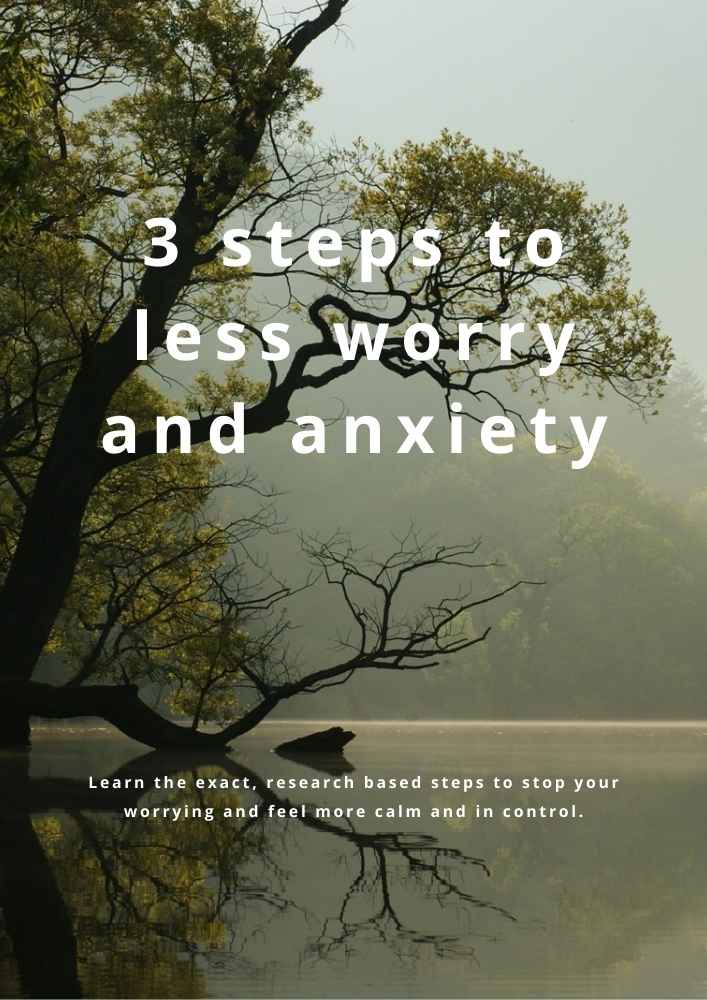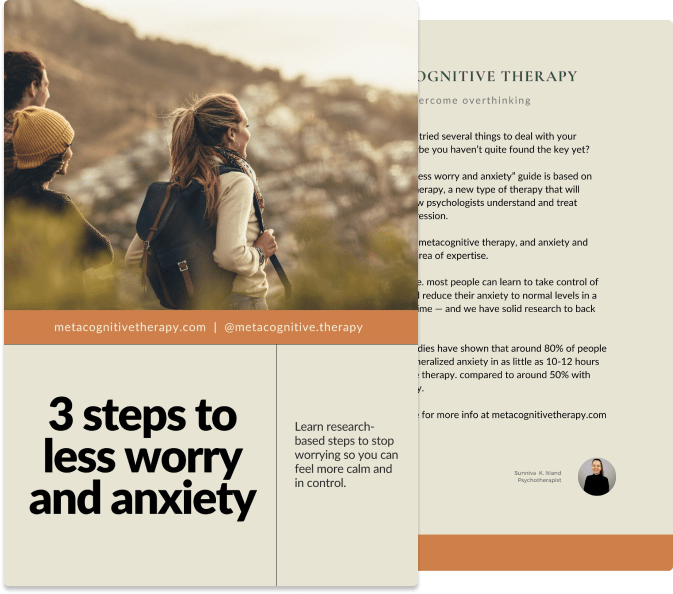How to break free from overthinking (and why you’re stuck in it)

Download our best tips on reducing anxiety and worrying
.jpeg)
.jpeg)
Do you ever feel trapped in an endless cycle of worry and overthinking? A lot of people believe that once worry starts, it's beyond their control — but what if this belief is the real problem?
The truth is, worry isn’t just a symptom of anxiety. Worrying is a deliberate process, a strategy people actively engage in, even when it feels automatic or uncontrollable.
These shifts in perspective on worrying and overthinking are explored in Metacognitive Therapy, a revolutionary approach that challenges our fundamental assumptions about mental health.
The myth of uncontrollable worry
Most people who struggle with overthinking rate their belief that worry is uncontrollable at 90-95 on a scale of 0-100. This conviction feels completely real, but it's based on a fundamental misunderstanding of how worry actually works.
The key insight here is distinguishing between the initial trigger thought (that first 'what if' that pops into your mind, for example) and the worry process that follows. We can't control what thoughts initially enter our consciousness, but we can absolutely control whether we actively worry and how long we choose to engage with them.
Consider this: If worry is truly uncontrollable, how does it ever end? If you worry for 10 hours a day, why not 16? What happens when there’s a work emergency, or your child gets hurt and needs attention, while you're deep in a worry spiral? You’d likely instantly redirect your attention to handle the issue, which proves that you can stop worry immediately when something more important demands your focus.

Download our best tips on reducing anxiety and worrying
How our beliefs perpetuate worry
People generally hold positive or negative beliefs (metabeliefs) about worrying, which determine how they respond to trigger thoughts.
Positive beliefs can sound like:
- 'If I worry, I'll be prepared'
- 'I have to worry about my loved ones to show I care'
- 'Dwelling on past mistakes will help me avoid repeating them'
- 'Worry helps me do a better job'
- 'If I don't worry about it, I won't do anything about it'
People also hold negative beliefs, such as:
- 'I have no control over my worry'
- 'My worries have taken control of me'
- 'I could lose my mind from worrying'
- “Worrying will harm me”
For people who hold both positive and negative beliefs, this creates a catch-22 situation: you believe you need to worry to function properly, but you also believe it's harmful and uncontrollable. This is the trap many overthinkers find themselves stuck in.
Practical strategies to overcome overthinking
The path to overcoming overthinking begins with recognizing the beliefs that are keeping you stuck. After all, how can you stop doing something that you think you need, or that you’re scared of? The following metacognitive therapy exercises can help you discover that you have control over your overthinking, and can shift your focus away from overthinking and back to your everyday life.
Detached Mindfulness This powerful technique involves learning to see worries as fleeting thoughts passing through your mind. Instead of engaging with every negative thought, try treating them like background noise and let them pass without engaging in them. You don't worry about every single thought thought that pops up — you selectively choose which thoughts you dwell, often without realizing it.
The Postponement Technique When you notice yourself starting to worry, you can postpone thinking about that concern. Tell yourself you'll return to this later (you can even set aside a designated “worry window” to use later if you need it) the same way you would postpone an inconvenient phone call. People often find they no longer feel the urge to worry about the issue when the time comes to revisit it. Worry postponement isn't about suppressing thoughts, it's about proving to yourself that you can decide whether and when to worry, and choosing to interrupt your usual cycle of overthinking.
The Paradox Exercise Here's an interesting discovery that combats negative beliefs about worry: When people deliberately try to worry as intensely as possible and attempt to lose control of their mind, they realize they can't actually 'lose control' and typically find that worry naturally fades after a few minutes. They run out of material, get bored, or find their attention naturally shifting elsewhere. This goes to show that even after actively trying to lose control of your mind, the mind always self-regulates.
The real problem isn't worry
The most liberating insight from metacognitive therapy is that worry itself isn't the problem… it's our attempts to control, suppress, or rationalize our way out of worry that makes it feel persistent and uncontrollable. The constant mental tennis match between anxious thoughts and rational rebuttals ultimately fuels the very cycle of overthinking we're trying to escape.
By understanding that worry is more controllable than we might think, and that our beliefs about worry are often the problem, we’re empowered to relate to our thoughts differently. The goal isn't to never have worrying thoughts again — it's to recognize that we get to choose how we respond to them, and that we have the power to interrupt overthinking.
If you’re interested in seeing if Metacognitive Therapy could help you on your mental health journey, take the quiz today to find out.




.jpeg)
.jpeg)
.jpeg)
.jpeg)
.jpeg)
.jpeg)
.jpeg)
.jpeg)
.jpeg)
.jpeg)
.jpeg)
.jpeg)
.jpeg)
.jpeg)
.jpeg)
.jpeg)
.jpeg)
.jpeg)
.jpeg)
.jpeg)

.jpeg)
.jpeg)
.jpeg)
.jpeg)
.jpeg)
%2520(1).jpeg)




.jpeg)



.jpeg)


.jpeg)







.jpeg)
.jpeg)
